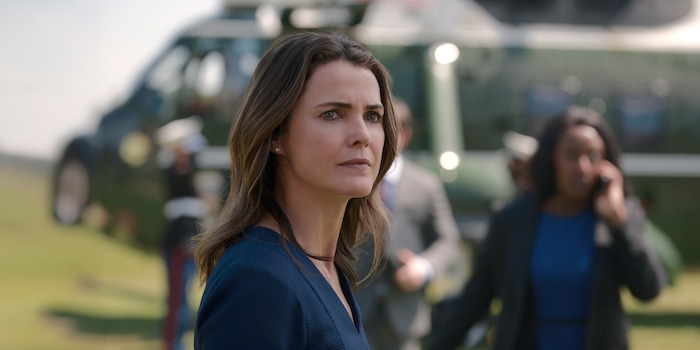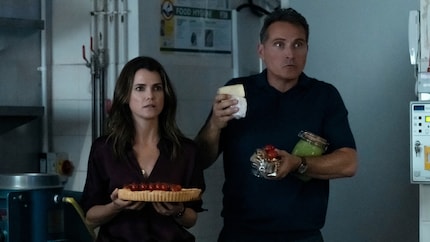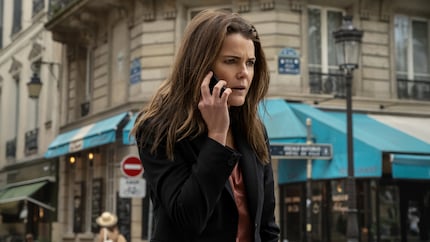
Opinion
Stranger Things season 5 – my favourite theory’s come true
by Cassie Mammone

It took me three series to discover The Diplomat. Now I’m wondering how I could’ve put off watching it for so long.
It’s not that I don’t like political dramas. Up until its…«special» sixth series, House of Cards offered sensational TV (and even the final series was better than it’s said to be). Borgen was incredibly clever and The Crown’s a majestic power play that’s far more political than it seems at the outset.
Somehow, political dramas just dropped off my radar. Or I stopped looking for them. Until The Diplomat came along, that is. It reminded me in the very few first minutes why I love this genre so much: it’s intelligent, it’s fast-paced – and it shows us that power games are sometimes more exciting when no one brandishes a gun.
The Diplomat centres on Kate Wyler (Keri Russell), a seasoned diplomat who’s suddenly appointed US ambassador to London in the midst of an international crisis. Through political power struggles, media frenzies and crumbling alliances, she has to literally save the world from the next political inferno. But her greatest challenge is at home.
Because her husband Hal Wyler (Rufus Sewell) – himself a brilliant but manipulative ex-ambassador – is struggling to cope with the fact that this time she’s in the spotlight.
This dynamic is electrifying because showrunner and writer Debora Cahn manages to turn the couple’s dialogues from mere conversations into real little power games. Sometimes partners, sometimes adversaries, sometimes lovers – sometimes all at the same time. This constant shift between trust and cold calculation is what makes their relationship so captivating. I genuinely never know whether they’re saving or sabotaging each other.
Keri Russell’s clearly the heart of it all. She plays Kate with a mixture of intelligence, weariness and – despite everything – unwavering optimism. Because she knows how power works and how destructive it can be. Her character’s vulnerable, but never weak. She stumbles, doubts and fights, and that’s exactly what makes her so real and human.

For his part, Rufus Sewel gives Hal the perfect dose of charm and venom to make every scene a dance with the devil. A man so seductive, charming and intelligent that you blindly trust him – and immediately regret it. Sometimes. Except when…well, you’ll have to see for yourselves.
What fascinates me most is the way The Diplomat portrays diplomacy. Not always as an elegant, boring parlour game, but as a world of backroom deals, late-night phone calls and crises that have to be defused in secret because the public must never find out about them.
And not only that. Crucial agreements about the future of entire nations aren’t made in official meetings, but in the semi-darkness of a corridor, in an inconspicuous office or on the way out the door. And the most important information is often not even said out loud. It’s implicitly conveyed – so subtly that I almost miss it if I’m not listening very carefully.

That’s exactly what makes the series so demanding. The Diplomat requires patience, attention and genuine engagement. It’s not something you can just have on in the background while scrolling through your social media feeds. It wants us to listen. To think. To understand what isn’t being said. To perceive those small, subtle shifts in power that – in real-world politics – are often more decisive than any public speech.
Politics as high-speed chess, so to speak.
Perhaps that’s why The Diplomat reminds me so much of a time when TV series truly challenged us. Attention. Patience. Passion. Because yes, you have to remember a lot of names, places and threads that only slowly weave together to form a pattern. Part of its appeal is that The Diplomat never insults the intelligence of its audience.
So, I let myself be drawn into this world full of intrigue and hidden messages. Admittedly, I was pretty behind, with the third series having just been released and a fourth already confirmed. So, if you haven’t jumped on the bandwagon yet, you couldn’t have chosen a better time.
Because The Diplomat isn’t just another good series. It’s a statement that intelligent TV’s still alive. I do regret arriving so late to the party and only now being able to join the conversation. But sometimes it really is worth arriving late – and staying late.
Do you think political dramas are making a comeback, or is The Diplomat the exception? Let me know in the comments.
I write about technology as if it were cinema, and about films as if they were real life. Between bits and blockbusters, I’m after stories that move people, not just generate clicks. And yes – sometimes I listen to film scores louder than I probably should.
This is a subjective opinion of the editorial team. It doesn't necessarily reflect the position of the company.
Show all